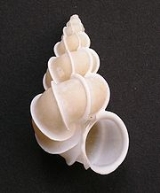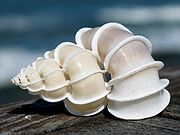
Epitonium scalare
Encyclopedia
Epitonium scalare, common name
the precious wentletrap, is a predatory or ectoparasitic species
of marine
gastropod with an operculum
, in the family Epitoniidae, the wentletraps.
In the 17th and 18th century this was once considered to be a very rare shell and specimens changed hands for large sums of money. Johan de la Faille
and Cosimo III de' Medici owned a wentletrap.
, in the Indian Ocean along Madagascar
and South Africa
, in the South West Pacific Ocean and along Fiji
Islands and Japan
.
 The shell of this species grows to a lengthbetween 25 mm to 72 mm.
The shell of this species grows to a lengthbetween 25 mm to 72 mm.
Many Epitonium species have shells that are very attractive and quite interesting in their structure. However this species is particularly striking, partly because it is large compared with the great majority of other species within the genus, but also because the whorls
themselves do not touch and so the shell is held together only by the well-developed ribs or costae.
Common name
A common name of a taxon or organism is a name in general use within a community; it is often contrasted with the scientific name for the same organism...
the precious wentletrap, is a predatory or ectoparasitic species
Species
In biology, a species is one of the basic units of biological classification and a taxonomic rank. A species is often defined as a group of organisms capable of interbreeding and producing fertile offspring. While in many cases this definition is adequate, more precise or differing measures are...
of marine
Marine (ocean)
Marine is an umbrella term. As an adjective it is usually applicable to things relating to the sea or ocean, such as marine biology, marine ecology and marine geology...
gastropod with an operculum
Operculum (gastropod)
The operculum, meaning little lid, is a corneous or calcareous anatomical structure which exists in many groups of sea snails and freshwater snails, and also in a few groups of land snails...
, in the family Epitoniidae, the wentletraps.
In the 17th and 18th century this was once considered to be a very rare shell and specimens changed hands for large sums of money. Johan de la Faille
Johan de la Faille
Johan de la Faille was a member of the vroedschap in Delft. As a supporter of prince William III of Orange, he was appointed in 1672, the Year of Disaster after the First Stadtholderless Period, when the Dutch Republic was in danger.Johan de la Faille was the owner of a famous curiosity cabinet,...
and Cosimo III de' Medici owned a wentletrap.
Distribution
This species is distributed in the Red SeaRed Sea
The Red Sea is a seawater inlet of the Indian Ocean, lying between Africa and Asia. The connection to the ocean is in the south through the Bab el Mandeb strait and the Gulf of Aden. In the north, there is the Sinai Peninsula, the Gulf of Aqaba, and the Gulf of Suez...
, in the Indian Ocean along Madagascar
Madagascar
The Republic of Madagascar is an island country located in the Indian Ocean off the southeastern coast of Africa...
and South Africa
South Africa
The Republic of South Africa is a country in southern Africa. Located at the southern tip of Africa, it is divided into nine provinces, with of coastline on the Atlantic and Indian oceans...
, in the South West Pacific Ocean and along Fiji
Fiji
Fiji , officially the Republic of Fiji , is an island nation in Melanesia in the South Pacific Ocean about northeast of New Zealand's North Island...
Islands and Japan
Japan
Japan is an island nation in East Asia. Located in the Pacific Ocean, it lies to the east of the Sea of Japan, China, North Korea, South Korea and Russia, stretching from the Sea of Okhotsk in the north to the East China Sea and Taiwan in the south...
.
Shell description

Many Epitonium species have shells that are very attractive and quite interesting in their structure. However this species is particularly striking, partly because it is large compared with the great majority of other species within the genus, but also because the whorls
Whorl (mollusc)
A whorl is a single, complete 360° revolution or turn in the spiral growth of a mollusc shell. A spiral configuration of the shell is found in of numerous gastropods, but it is also found in shelled cephalopods including Nautilus, Spirula and the large extinct subclass of cephalopods known as the...
themselves do not touch and so the shell is held together only by the well-developed ribs or costae.

